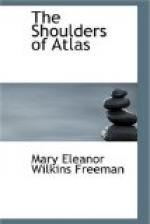Although it was easy for a man, especially for a young marriageable man, to obtain board in East Westland, it was not so easy for a woman; and the facts of her youth and good looks, and presumably marriageable estate, rendered it still more difficult. There was in the little village a hotel, so-called, which had formerly been the tavern. It was now the East Westland House. Once it had been the Sign of the Horse. The old sign-board upon which a steed in flaming red, rampant upon a crude green field against a crude blue sky, had been painted by some local artist, all unknown to fame, and long since at rest in the village graveyard, still remained in the hotel attic, tilted under the dusty eaves.
The Sign of the Horse had been in former days a flourishing hostelry, before which, twice a day, the Boston and the Alford stages had drawn up with mighty flourishes of horns and gallant rearings of jaded steeds. Scarcely a night but it had been crowded by travellers who stayed overnight for the sake of the good beds and the good table and good bar. Now there was no bar. East Westland was a strictly temperance village, and all the liquor to be obtained was exceedingly bad, and some declared diluted by the waters of the village pond.
There was a very small stock of rum, gin, and whiskey, and very young and morbid California wines, kept at the village drug store, and dispensed by Albion Bennet. Albion required a deal of red-tape before he would sell even these doubtful beverages for strictly medicinal purposes. He was in mortal terror of being arrested and taken to the county-seat at Newholm for violation of the liquor law. Albion, although a young and sturdy man not past his youth, was exceedingly afraid of everything. He was unmarried, and boarded at the hotel. There he was divided between fear of burglars, if he slept on the first floor, and of fire if he slept on the second. He compromised by sleeping on the second, with a sufficient length of stout, knotted muslin stowed away in his trunk, to be attached to the bed-post and reach the ground in case of a conflagration.
There was no bank in East Westland, none nearer than Alford, six miles away, and poor Albion was at his wit’s end to keep his daily receipts with safety to them and himself. He had finally hit upon the expedient of leaving them every night with Sidney Meeks, who was afraid of nothing. “If anything happens to your money, Albion,” said Sidney, “I’ll make it good, even if I have to sell my wine-cellar.” Albion was afraid even to keep a revolver. His state of terror was pitiable, and the more so because he had a fear of betraying it, which was to some extent the most cruel fear of all. Sidney Meeks was probably the only person in East Westland who understood how it was with him, and he kept his knowledge to himself. Sidney was astute on a diagnosis of his fellow-men’s mentalities, and he had an almost womanly compassion even for those weaknesses of which he himself was incapable.




